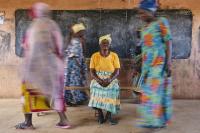 Lee-Ann Olwage, who admits she struggles with her own mental health issues, also has family members who have suffered or are suffering from Alzheimer's. For this reason, she states that, with her work, she aims to create a space in which the people she photographs can play an active role in creating the images and that, above all, makes them feel like the true “heroines” of their own stories.
Lee-Ann Olwage, who admits she struggles with her own mental health issues, also has family members who have suffered or are suffering from Alzheimer's. For this reason, she states that, with her work, she aims to create a space in which the people she photographs can play an active role in creating the images and that, above all, makes them feel like the true “heroines” of their own stories.
Face to face
13.12.2023 | by Mariana Moniz
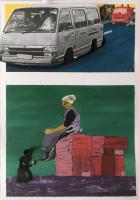 The article by Achille, I think, significantly points out the legitimacy of being limited from obtaining oxygen, by explicitly pointing out that for some parts of the world where healthcare is part of organized neglect, we are faced with more than just the need to physically breathe. There is a prohibition of breathing that is systemic in nature which is part of a larger need for the freedom to breathe (live). For example the violent killings of black civilians by the police in South Africa due to an unchecked implementation of COVID-19 laws and regulations left us questioning the relevance (need) for policing systems embedded in colonial rhetoric.
The article by Achille, I think, significantly points out the legitimacy of being limited from obtaining oxygen, by explicitly pointing out that for some parts of the world where healthcare is part of organized neglect, we are faced with more than just the need to physically breathe. There is a prohibition of breathing that is systemic in nature which is part of a larger need for the freedom to breathe (live). For example the violent killings of black civilians by the police in South Africa due to an unchecked implementation of COVID-19 laws and regulations left us questioning the relevance (need) for policing systems embedded in colonial rhetoric.
Face to face
08.04.2021 | by Marcos Jinguba
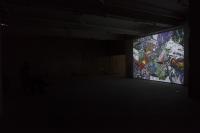 The exhibition Lost Lover speaks about the political, historical and geographical conditions through which knowledge is produced and controlled. The screening program assembled by Lara Koseff was originally presented in Rio de Janeiro, in the courtyard of Lanchonete, now in Rampa, Porto.
In the front room, 11 single-channel video pieces are projected in a loop. The authors, who are mostly from South Africa, confront us with the abandon of fear, thus calling to action topics that are often and strategically silenced.
The exhibition Lost Lover speaks about the political, historical and geographical conditions through which knowledge is produced and controlled. The screening program assembled by Lara Koseff was originally presented in Rio de Janeiro, in the courtyard of Lanchonete, now in Rampa, Porto.
In the front room, 11 single-channel video pieces are projected in a loop. The authors, who are mostly from South Africa, confront us with the abandon of fear, thus calling to action topics that are often and strategically silenced.
I'll visit
12.06.2019 | by Eduarda Neves
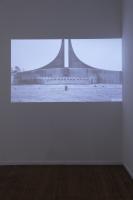 The idea of freedom as a point of arrival – an accomplishment that lies behind us, materialized and monumentalized; freedom as a ballot, a single gesture hinged to a turning point; freedom carved in stone, set on a hill, allegorized in a recognizable form; freedom as a lofty place we ascend to, is one that can be counterpoised to freedom as departure, as work and process; an immaterial, contingent ideal; an ambition and responsibility which escapes and evades one’s grasp, but to which one continuously commits.
The idea of freedom as a point of arrival – an accomplishment that lies behind us, materialized and monumentalized; freedom as a ballot, a single gesture hinged to a turning point; freedom carved in stone, set on a hill, allegorized in a recognizable form; freedom as a lofty place we ascend to, is one that can be counterpoised to freedom as departure, as work and process; an immaterial, contingent ideal; an ambition and responsibility which escapes and evades one’s grasp, but to which one continuously commits.
I'll visit
08.06.2017 | by Nancy Dantas
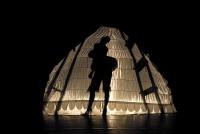 South Africa´s theatre gains international recognition for its performance arts productions due to applying diverse aesthetics and the search of new stage approaches by many different artists. In addition, regularly scheduled national and international dance, performance art and theater festivals are organized like Invecting the City in Cape Town, Dance Umbrella in Johannesburg, and National Arts Festival in Grahams Town etc.
South Africa´s theatre gains international recognition for its performance arts productions due to applying diverse aesthetics and the search of new stage approaches by many different artists. In addition, regularly scheduled national and international dance, performance art and theater festivals are organized like Invecting the City in Cape Town, Dance Umbrella in Johannesburg, and National Arts Festival in Grahams Town etc.
Stages
07.03.2012 | by Grit Köppen
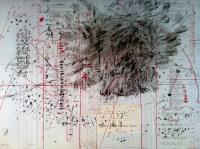 If any African artist working today can be described as internationally acclaimed, instantly recognizable, with a style marked by a unique personality, it is the South African William Kentridge. A ubiquitous presence in art festivals and exhibitions and in the permanent collections of the great museums, a recipient of numerous prizes, encomia, and honorary doctorates, Kentridge was born in Johannesburg in 1955, when popular uprisings and increasingly harsh repression drew clear lines between partisans and opponents of the racist authoritarian regime.
If any African artist working today can be described as internationally acclaimed, instantly recognizable, with a style marked by a unique personality, it is the South African William Kentridge. A ubiquitous presence in art festivals and exhibitions and in the permanent collections of the great museums, a recipient of numerous prizes, encomia, and honorary doctorates, Kentridge was born in Johannesburg in 1955, when popular uprisings and increasingly harsh repression drew clear lines between partisans and opponents of the racist authoritarian regime.
I'll visit
21.06.2011 | by Beatriz Leal Riesco
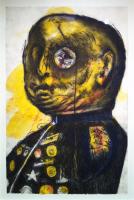 The notion of art as a vehicle for criticism and resistance was taken up in a programmatic manner by the South African group Resistance Art at the end of the nineteen-seventies to the end of confronting institutionalized racism in the then-totalitarian nation. A direct result of the 1976 Soweto uprising and the 1977 murder of the Black Consciousness leader Steve Biko, it represented a “galvanized anti-apartheid activism” in the artistic and cultural spheres. The idea of “culture as a weapon of political struggle,” affirmed by a multiethnic convocation of artists in Botswana in 1982, appears to be the overarching theme of the MOMA’s curators in the exhibition Impressions from South Africa, 1965 to Now, with an eye, perhaps, to those presently fomenting global crises and the sensibilities they must produce in an audience once again attuned to injustice and inequality (Image 1).
The notion of art as a vehicle for criticism and resistance was taken up in a programmatic manner by the South African group Resistance Art at the end of the nineteen-seventies to the end of confronting institutionalized racism in the then-totalitarian nation. A direct result of the 1976 Soweto uprising and the 1977 murder of the Black Consciousness leader Steve Biko, it represented a “galvanized anti-apartheid activism” in the artistic and cultural spheres. The idea of “culture as a weapon of political struggle,” affirmed by a multiethnic convocation of artists in Botswana in 1982, appears to be the overarching theme of the MOMA’s curators in the exhibition Impressions from South Africa, 1965 to Now, with an eye, perhaps, to those presently fomenting global crises and the sensibilities they must produce in an audience once again attuned to injustice and inequality (Image 1).
I'll visit
17.05.2011 | by Beatriz Leal Riesco
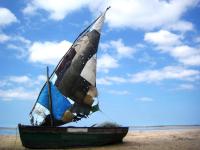 fter some back and forth travelling Lisbon-Madrid-Lisbon and some other back and forth travelling Maputo-Johannesburg-Maputo, I started finding linkage points between the voyage in the European Southwest and the voyage in the African Southeast. Both courses are about 375 miles long, from country to country, from capital to capital; syntonizing into another idiom when crossing the border, changing the bank notes for others – a step no longer necessary in the Iberian Peninsula. These are voyages in longitude, to the Orient: Madrid and Maputo; to the Occident: Lisbon and Johannesburg.
fter some back and forth travelling Lisbon-Madrid-Lisbon and some other back and forth travelling Maputo-Johannesburg-Maputo, I started finding linkage points between the voyage in the European Southwest and the voyage in the African Southeast. Both courses are about 375 miles long, from country to country, from capital to capital; syntonizing into another idiom when crossing the border, changing the bank notes for others – a step no longer necessary in the Iberian Peninsula. These are voyages in longitude, to the Orient: Madrid and Maputo; to the Occident: Lisbon and Johannesburg.
I'll visit
17.12.2010 | by Nuno Milagre
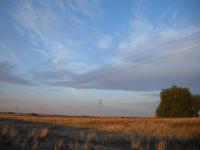 Ruy Duarte de Carvalho, who recently left this world, lived a life associated to traveling, which incidentally is one of the favorite themes of his books - a production that goes beyond a dozen, including poetry, fiction and essay. With the course of agricultural regent, which he concluded in 1960, went through big part of the Angolan territory working on coffee plantations and also in traditional agro-pastoral production, taking care of sheep in Caranculo, in the (then) province of Moçâmedes, now Namibe.
Ruy Duarte de Carvalho, who recently left this world, lived a life associated to traveling, which incidentally is one of the favorite themes of his books - a production that goes beyond a dozen, including poetry, fiction and essay. With the course of agricultural regent, which he concluded in 1960, went through big part of the Angolan territory working on coffee plantations and also in traditional agro-pastoral production, taking care of sheep in Caranculo, in the (then) province of Moçâmedes, now Namibe.
Ruy Duarte de Carvalho
13.11.2010 | by Marta Lança
 Lee-Ann Olwage, who admits she struggles with her own mental health issues, also has family members who have suffered or are suffering from Alzheimer's. For this reason, she states that, with her work, she aims to create a space in which the people she photographs can play an active role in creating the images and that, above all, makes them feel like the true “heroines” of their own stories.
Lee-Ann Olwage, who admits she struggles with her own mental health issues, also has family members who have suffered or are suffering from Alzheimer's. For this reason, she states that, with her work, she aims to create a space in which the people she photographs can play an active role in creating the images and that, above all, makes them feel like the true “heroines” of their own stories.  The article by Achille, I think, significantly points out the legitimacy of being limited from obtaining oxygen, by explicitly pointing out that for some parts of the world where healthcare is part of organized neglect, we are faced with more than just the need to physically breathe. There is a prohibition of breathing that is systemic in nature which is part of a larger need for the freedom to breathe (live). For example the violent killings of black civilians by the police in South Africa due to an unchecked implementation of COVID-19 laws and regulations left us questioning the relevance (need) for policing systems embedded in colonial rhetoric.
The article by Achille, I think, significantly points out the legitimacy of being limited from obtaining oxygen, by explicitly pointing out that for some parts of the world where healthcare is part of organized neglect, we are faced with more than just the need to physically breathe. There is a prohibition of breathing that is systemic in nature which is part of a larger need for the freedom to breathe (live). For example the violent killings of black civilians by the police in South Africa due to an unchecked implementation of COVID-19 laws and regulations left us questioning the relevance (need) for policing systems embedded in colonial rhetoric.  The exhibition Lost Lover speaks about the political, historical and geographical conditions through which knowledge is produced and controlled. The screening program assembled by Lara Koseff was originally presented in Rio de Janeiro, in the courtyard of Lanchonete, now in Rampa, Porto.
In the front room, 11 single-channel video pieces are projected in a loop. The authors, who are mostly from South Africa, confront us with the abandon of fear, thus calling to action topics that are often and strategically silenced.
The exhibition Lost Lover speaks about the political, historical and geographical conditions through which knowledge is produced and controlled. The screening program assembled by Lara Koseff was originally presented in Rio de Janeiro, in the courtyard of Lanchonete, now in Rampa, Porto.
In the front room, 11 single-channel video pieces are projected in a loop. The authors, who are mostly from South Africa, confront us with the abandon of fear, thus calling to action topics that are often and strategically silenced.  The idea of freedom as a point of arrival – an accomplishment that lies behind us, materialized and monumentalized; freedom as a ballot, a single gesture hinged to a turning point; freedom carved in stone, set on a hill, allegorized in a recognizable form; freedom as a lofty place we ascend to, is one that can be counterpoised to freedom as departure, as work and process; an immaterial, contingent ideal; an ambition and responsibility which escapes and evades one’s grasp, but to which one continuously commits.
The idea of freedom as a point of arrival – an accomplishment that lies behind us, materialized and monumentalized; freedom as a ballot, a single gesture hinged to a turning point; freedom carved in stone, set on a hill, allegorized in a recognizable form; freedom as a lofty place we ascend to, is one that can be counterpoised to freedom as departure, as work and process; an immaterial, contingent ideal; an ambition and responsibility which escapes and evades one’s grasp, but to which one continuously commits.  South Africa´s theatre gains international recognition for its performance arts productions due to applying diverse aesthetics and the search of new stage approaches by many different artists. In addition, regularly scheduled national and international dance, performance art and theater festivals are organized like Invecting the City in Cape Town, Dance Umbrella in Johannesburg, and National Arts Festival in Grahams Town etc.
South Africa´s theatre gains international recognition for its performance arts productions due to applying diverse aesthetics and the search of new stage approaches by many different artists. In addition, regularly scheduled national and international dance, performance art and theater festivals are organized like Invecting the City in Cape Town, Dance Umbrella in Johannesburg, and National Arts Festival in Grahams Town etc.  If any African artist working today can be described as internationally acclaimed, instantly recognizable, with a style marked by a unique personality, it is the South African William Kentridge. A ubiquitous presence in art festivals and exhibitions and in the permanent collections of the great museums, a recipient of numerous prizes, encomia, and honorary doctorates, Kentridge was born in Johannesburg in 1955, when popular uprisings and increasingly harsh repression drew clear lines between partisans and opponents of the racist authoritarian regime.
If any African artist working today can be described as internationally acclaimed, instantly recognizable, with a style marked by a unique personality, it is the South African William Kentridge. A ubiquitous presence in art festivals and exhibitions and in the permanent collections of the great museums, a recipient of numerous prizes, encomia, and honorary doctorates, Kentridge was born in Johannesburg in 1955, when popular uprisings and increasingly harsh repression drew clear lines between partisans and opponents of the racist authoritarian regime.  The notion of art as a vehicle for criticism and resistance was taken up in a programmatic manner by the South African group Resistance Art at the end of the nineteen-seventies to the end of confronting institutionalized racism in the then-totalitarian nation. A direct result of the 1976 Soweto uprising and the 1977 murder of the Black Consciousness leader Steve Biko, it represented a “galvanized anti-apartheid activism” in the artistic and cultural spheres. The idea of “culture as a weapon of political struggle,” affirmed by a multiethnic convocation of artists in Botswana in 1982, appears to be the overarching theme of the MOMA’s curators in the exhibition Impressions from South Africa, 1965 to Now, with an eye, perhaps, to those presently fomenting global crises and the sensibilities they must produce in an audience once again attuned to injustice and inequality (Image 1).
The notion of art as a vehicle for criticism and resistance was taken up in a programmatic manner by the South African group Resistance Art at the end of the nineteen-seventies to the end of confronting institutionalized racism in the then-totalitarian nation. A direct result of the 1976 Soweto uprising and the 1977 murder of the Black Consciousness leader Steve Biko, it represented a “galvanized anti-apartheid activism” in the artistic and cultural spheres. The idea of “culture as a weapon of political struggle,” affirmed by a multiethnic convocation of artists in Botswana in 1982, appears to be the overarching theme of the MOMA’s curators in the exhibition Impressions from South Africa, 1965 to Now, with an eye, perhaps, to those presently fomenting global crises and the sensibilities they must produce in an audience once again attuned to injustice and inequality (Image 1).  fter some back and forth travelling Lisbon-Madrid-Lisbon and some other back and forth travelling Maputo-Johannesburg-Maputo, I started finding linkage points between the voyage in the European Southwest and the voyage in the African Southeast. Both courses are about 375 miles long, from country to country, from capital to capital; syntonizing into another idiom when crossing the border, changing the bank notes for others – a step no longer necessary in the Iberian Peninsula. These are voyages in longitude, to the Orient: Madrid and Maputo; to the Occident: Lisbon and Johannesburg.
fter some back and forth travelling Lisbon-Madrid-Lisbon and some other back and forth travelling Maputo-Johannesburg-Maputo, I started finding linkage points between the voyage in the European Southwest and the voyage in the African Southeast. Both courses are about 375 miles long, from country to country, from capital to capital; syntonizing into another idiom when crossing the border, changing the bank notes for others – a step no longer necessary in the Iberian Peninsula. These are voyages in longitude, to the Orient: Madrid and Maputo; to the Occident: Lisbon and Johannesburg.  Ruy Duarte de Carvalho, who recently left this world, lived a life associated to traveling, which incidentally is one of the favorite themes of his books - a production that goes beyond a dozen, including poetry, fiction and essay. With the course of agricultural regent, which he concluded in 1960, went through big part of the Angolan territory working on coffee plantations and also in traditional agro-pastoral production, taking care of sheep in Caranculo, in the (then) province of Moçâmedes, now Namibe.
Ruy Duarte de Carvalho, who recently left this world, lived a life associated to traveling, which incidentally is one of the favorite themes of his books - a production that goes beyond a dozen, including poetry, fiction and essay. With the course of agricultural regent, which he concluded in 1960, went through big part of the Angolan territory working on coffee plantations and also in traditional agro-pastoral production, taking care of sheep in Caranculo, in the (then) province of Moçâmedes, now Namibe. 